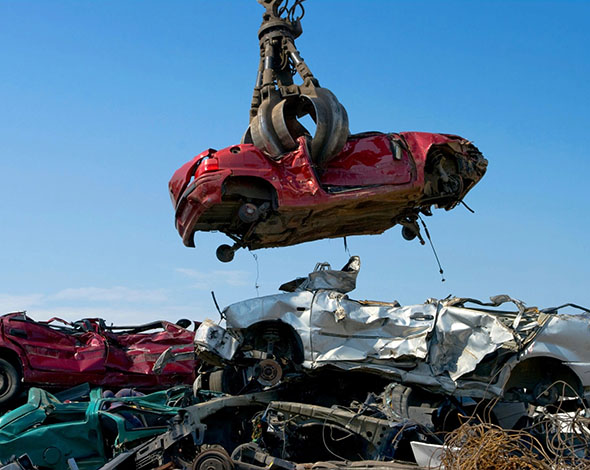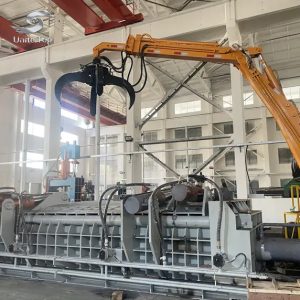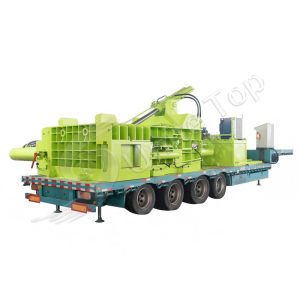Car balers are crucial for the automotive recycling industry, helping businesses efficiently compress scrapped vehicles into manageable bales. These machines streamline the handling, transportation, and storage of recycled cars, making the process economically viable and environmentally sustainable.
Understanding the cost of car balers is essential for recyclers to budget wisely and make informed purchasing decisions.
This article will explore the different types of car balers and the factors affecting their prices and offer insights into budgeting for the suitable model to meet your business needs.
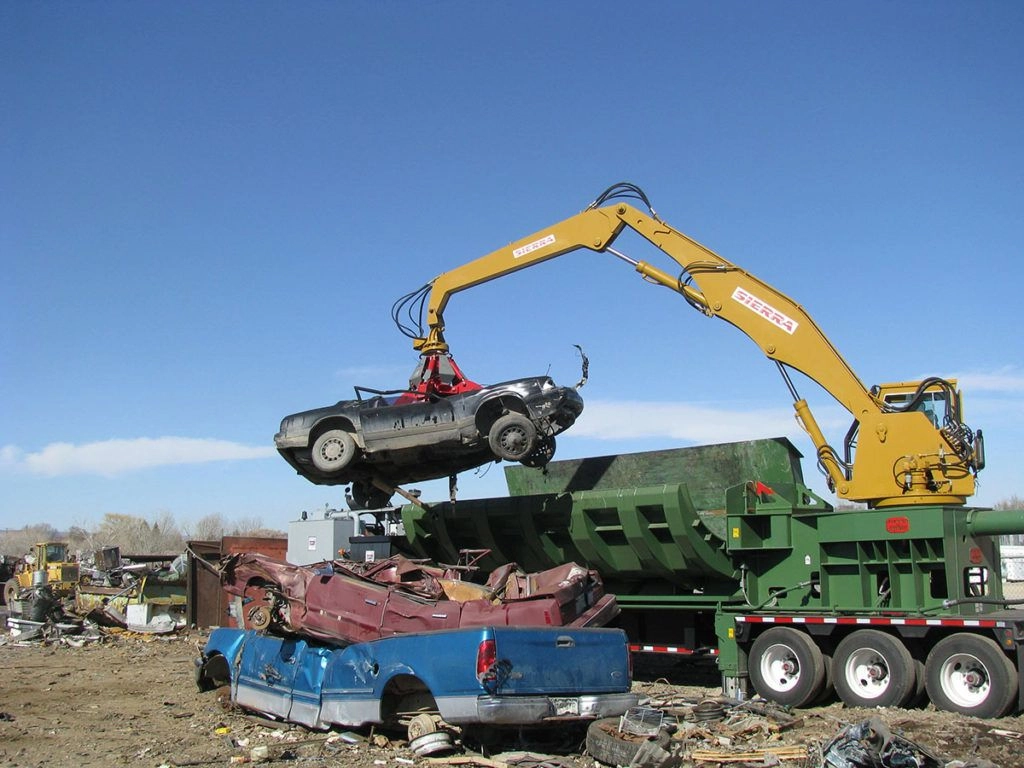
Types of Car Balers
Car balers are integral to recycling, compressing scrapped vehicles into compact bales for more accessible transportation and processing. Several car balers are available, each suited to different operational needs and scales.
Here’s a closer look at the primary types:
1. Single Ram Car Baler
Description: Single-ram balers use one hydraulic ram to compress the car into a bale. They are simpler in design and typically more affordable.
Typical Uses: Ideal for smaller recycling facilities with a moderate volume of cars. They are easier to maintain due to their less complex mechanics.
2. Double Ram Car Baler
Description: Double ram balers have two hydraulic rams that compress the car from two sides. This allows for denser, more uniformly shaped bales.
Benefits: More efficient at processing large volumes of cars and producing denser bales, which can be crucial for optimizing transport and storage.
Suitability: Best for more extensive operations that need to process a high volume of cars regularly.
3. Portable Car Baler
Description: Portable car balers are designed to be mobile, allowing them to be used at various locations. These balers can be towed and set up wherever they are needed.
Convenience Factors: They are handy for facilities that must clear multiple sites or companies that offer on-site recycling services.
Suitability: Ideal for operations that require flexibility in terms of location, such as scrapyards that serve broad geographic areas.
Each type of car baler offers distinct advantages depending on a recycling operation’s specific needs. Factors such as the volume of cars processed, the space available for equipment, and the need for mobility can influence the choice of an appropriate car baler.
Understanding these types will help businesses make informed decisions tailored to their operational demands and financial capabilities.
Factors Influencing the Cost of Car Balers
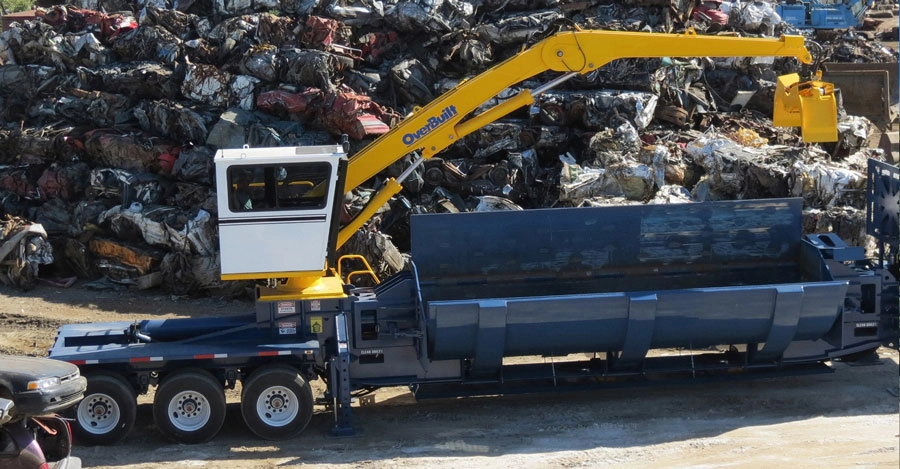
The cost of car balers can vary significantly based on several key factors. Understanding these can help you make a more informed purchasing decision, ensuring you find a baler that meets your needs without exceeding your budget.
Here’s a breakdown of the primary factors that influence the cost of car balers:
1. Size and Capacity
Impact on Price: Due to increased material and manufacturing complexity, larger balers with higher capacity to handle more or larger vehicles typically have higher costs.
Operational Considerations: Choose a baler size that matches your typical workload to avoid overpaying for unnecessary capacity.
2. Automation Level
Manual vs. Automated Systems: Fully automated balers, which require less manual intervention and can operate more efficiently, are more expensive than manual or semi-automated options.
Cost vs. Efficiency: Automated systems are pricier but can offer long-term savings through reduced labor costs and faster processing times.
3. Build Quality and Materials
Durability: High-quality materials and construction lead to a more durable machine, which can be crucial for handling the heavy-duty nature of car baling.
Initial Cost vs. Longevity: Investing in a higher-quality baler can reduce the frequency and cost of repairs, translating to lower overall ownership costs despite a higher initial price.
4. Brand and Manufacturer
Reputation and Reliability: Well-known brands often charge more, but they might offer better reliability, customer service, and part availability.
Warranty and Support: Consider the manufacturer’s warranty and the availability of support, which can add value beyond the initial purchase price.
5. New vs. Used
Depreciation: Used balers can be significantly cheaper and offer good value, especially if they are well-maintained.
Risks: However, used equipment might carry higher maintenance costs and shorter lifespans, which must be weighed against the initial savings.
6. Additional Features
Customization: Special features like moisture extraction systems, wireless operation, or specific safety features can add to the cost.
Necessity vs. Luxury: Assess which features are essential for your operations and which luxuries may not justify the additional expense.
7. Geographic Location
Shipping Costs: Shipping heavy equipment like a car baler can vary widely depending on geographic location.
Import Duties: Import duties and taxes can significantly affect the cost of international purchases.
By carefully considering these factors, you can better understand the pricing landscape for car balers and select a model that offers the best balance of price, performance, and longevity for your specific needs.
Price Range and Budget Considerations
When planning to purchase a car baler, it is crucial to understand the price range and align it with your budget. Car balers vary significantly in price based on their size, capacity, features, and previously discussed factors.
Here’s a breakdown of the typical price ranges and budget considerations for different types of car balers:
Entry-Level Models
Price Range: Entry-level car balers typically cost between $50,000 to $100,000.
Features: These models usually have lower capacity and fewer automated features. They are best suited for smaller operations that handle a modest volume of cars.
Considerations: These balers are a good starting point for businesses entering the car recycling market or having limited financial resources.
Mid-Range Models
Price Range: Mid-range car balers can cost anywhere from $100,000 to $300,000.
Features: These balers often include more automation, higher capacity, and better durability. They can handle more frequent use and larger volumes of material.
Considerations: Suitable for growing businesses that need improved efficiency and capacity but are not yet ready to invest in the highest-end machines.
High-end Models
Price Range: High-end car balers can exceed $300,000, with some of the most advanced models costing upwards of $500,000 or more.
Features: These include top-of-the-line automation, maximum capacity, and features such as complete remote control, integration into larger recycling systems, and superior build quality.
Considerations: Ideal for extensive recycling facilities that process a high volume of cars daily and require the highest levels of efficiency and reliability.
Additional Budget Considerations
Installation Costs: Depending on the complexity of the equipment, installation costs can be significant and should be included in the initial budget.
Maintenance Costs: Higher-end balers might have lower long-term maintenance costs due to better build quality, but the availability and price of spare parts should also be considered.
Operational Costs: Consider the baler’s energy and labor costs. More efficient, although more expensive, models might offer savings in these areas over time.
Financing Options
Leasing: Leasing a car baler can be cost-effective if upfront capital is limited. This makes upgrading more accessible and can include maintenance in the lease terms.
Loans: Financing the purchase through a loan can spread the cost over time but will include interest payments.
Future Proofing
Scalability: Consider whether the baler can handle anticipated future growth in volume. Investing in a slightly larger capacity than is currently needed can prevent the need for an early upgrade.
Resale Value: High-quality balers may retain value and be more accessible to sell if your needs change.
Understanding these price ranges and considerations will help you make informed decisions based on operational needs and financial capabilities. Proper budgeting includes the purchase price and considers ongoing costs and potential growth, ensuring that your investment remains viable in the long term.
Where to Buy Car Balers
When purchasing a car baler, knowing where to buy one can significantly impact the cost, quality, and service you receive. Here are some options for acquiring a car baler, each with its own set of benefits and considerations:
1. Direct from Manufacturers
Advantages: Buying directly from the manufacturer usually ensures you get the latest model, full warranty, and comprehensive support services. It can also offer customization opportunities according to your specific needs.
Considerations: Direct purchases may be more expensive than other sources, and additional shipping costs could depend on the manufacturer’s location.
2. Through Distributors
Advantages: Distributors often have a range of equipment from various manufacturers, providing more options to compare. They might offer competitive pricing due to bulk buying and sales targets.
Considerations: While purchasing through distributors can be cost-effective, it may limit direct contact with the manufacturer, affecting the resolution of specific technical issues or the acquisition of custom parts.
3. Used Equipment Dealers
Advantages: Used equipment can be significantly cheaper than new alternatives. Dealers specializing in used industrial machinery often have a good selection and can offer insights into the condition and longevity of the equipment.
Considerations: There’s always a risk with used equipment regarding its condition and remaining lifespan. It’s important to thoroughly inspect the baler and possibly invest in refurbishing it.
4. Online Marketplaces
Advantages: Websites like eBay, Alibaba, or industry-specific sites offer a broad selection of car balers, sometimes at lower prices. They can also provide buyer protections and reviews to help gauge the reliability of sellers.
Considerations: Shipping heavy equipment can raise the risk of fraud and create logistical challenges. Ensure the seller’s credibility and the terms of the sale are straightforward.
5. Auctions
Advantages: Auctions can be a source of bargains, particularly for businesses looking to liquidate assets quickly. They provide opportunities to purchase equipment at potentially below-market rates.
Considerations: The “as-is” nature of auction sales means there’s little to no guarantee of the equipment’s condition. Due diligence and possibly visiting the site to inspect the baler are recommended.
6. Trade Shows and Industry Conferences
Advantages: These events offer the chance to see multiple products in action, compare them directly, and negotiate deals. They also provide networking opportunities with manufacturers and other buyers who can offer valuable insights.
Considerations: The timing and location of these events may not always align with your purchasing timeline or geography, potentially adding travel costs.
7. Leasing Companies
Advantages: Leasing a car baler might be an option if upfront capital is limited. This choice allows for lower initial expenditures and often includes maintenance in the leasing agreement.
Considerations: Leasing can be more expensive over time than purchasing outright, and there may be restrictions on the use or customization of the equipment.
When choosing where to buy a car baler, weigh these options against your business needs, budget, and the level of support you anticipate needing. Making an informed decision will help ensure you acquire the right equipment that offers the best value for your investment.
Conclusion
In conclusion, purchasing a car baler involves more than just the initial price. The total cost of ownership, which includes installation, maintenance, and operational expenses, must be considered.
Making an informed decision requires understanding these ongoing costs and the baler’s efficiency and durability. By evaluating all these factors, businesses can choose a car baler that fits their budget and supports their long-term operational goals in the recycling industry.

